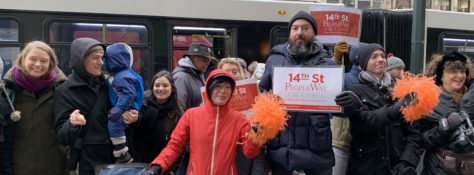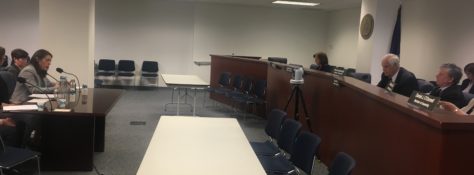In response to several months of advocacy by NYLCV and its partners, NYC Mayor de Blasio and the NYC Department of Transportation recently announced that they will implement a busway pilot program on 14th Street starting in June. The aim of this program is to prioritize transit traffic making travel on this busy thoroughfare quicker for straphangers during the L-train tunnel repair.
Learn MoreNews
Together with The Nature Conservancy in New York, NRDC New York, and Audubon NY, NYLCV president Julie Tighe testified before the New York State Assembly about the need for urgent action this session on climate. She stated that we must reduce our net greenhouse emissions as close to zero as we can and that climate legislation should include carbon-neutrality and a clean electric grid.
Learn MoreNews
In December 2018, most of the Transportation and Climate Initiative states committed to developing a clean transportation policy by the end of 2019. But New York was not part of that commitment. NYLCV joined other advocacy groups in Our Transportation Future to press for New York to act and advocate for the best approach to address emissions from the transportation sector.
Learn MoreNews
Along with New Yorkers for Parks, we recently announced the winners of our Earth Month photo contest, which was held to raise awareness about their Play Fair campaign.
Learn MoreNews
The Metropolitan Transit Authority (MTA) is embracing solar power in a new initiative that will help fight greenhouse gas emissions and give the authority a new income stream to improve public transit. It plans to lease more than 10 million square feet of its rooftop space to solar power generating companies.
Learn MoreNews
Last week, the State Senate and Assembly both overwhelmingly passed the Child Safe Products Act (A06296-A/S. 501-B) - also known as the Toxic Toys bill, a long overdue step forward in protecting our children’s health and our environment.
Learn MoreNews
The new single-use bag law gives counties and cities the option to opt-in to a five-cent fee for paper bags, which would further reduce litter and solid waste pollution and substantially lower carbon emissions from producing paper bags. Some local governments in New York have already voted in favor of the fee, while others have either opposed it or are still deliberating.
Learn More


